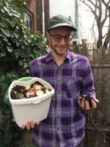Worm Inn Fruit Fly Trap
In the warmer months, I have challenges with fruit flies surrounding my Worm Inn from time to time. The key is to pay attention to the moisture level inside the Worm Inn and cover your deposits with bedding materials to keep them to a minimum. I decided to try putting my fruit fly trap on top of the Inn instead of on the ground beneath it. I found that I caught nearly all the fruit flies overnight by having it on top! If you haven't made a fruit fly trap before, they're really quick and cheap to make. All you need is: -A jar -A few drops of dish soap -1 cup of apple cider vinegar (wine works, too) -A piece of plastic wrap large enough to cover the opening…
